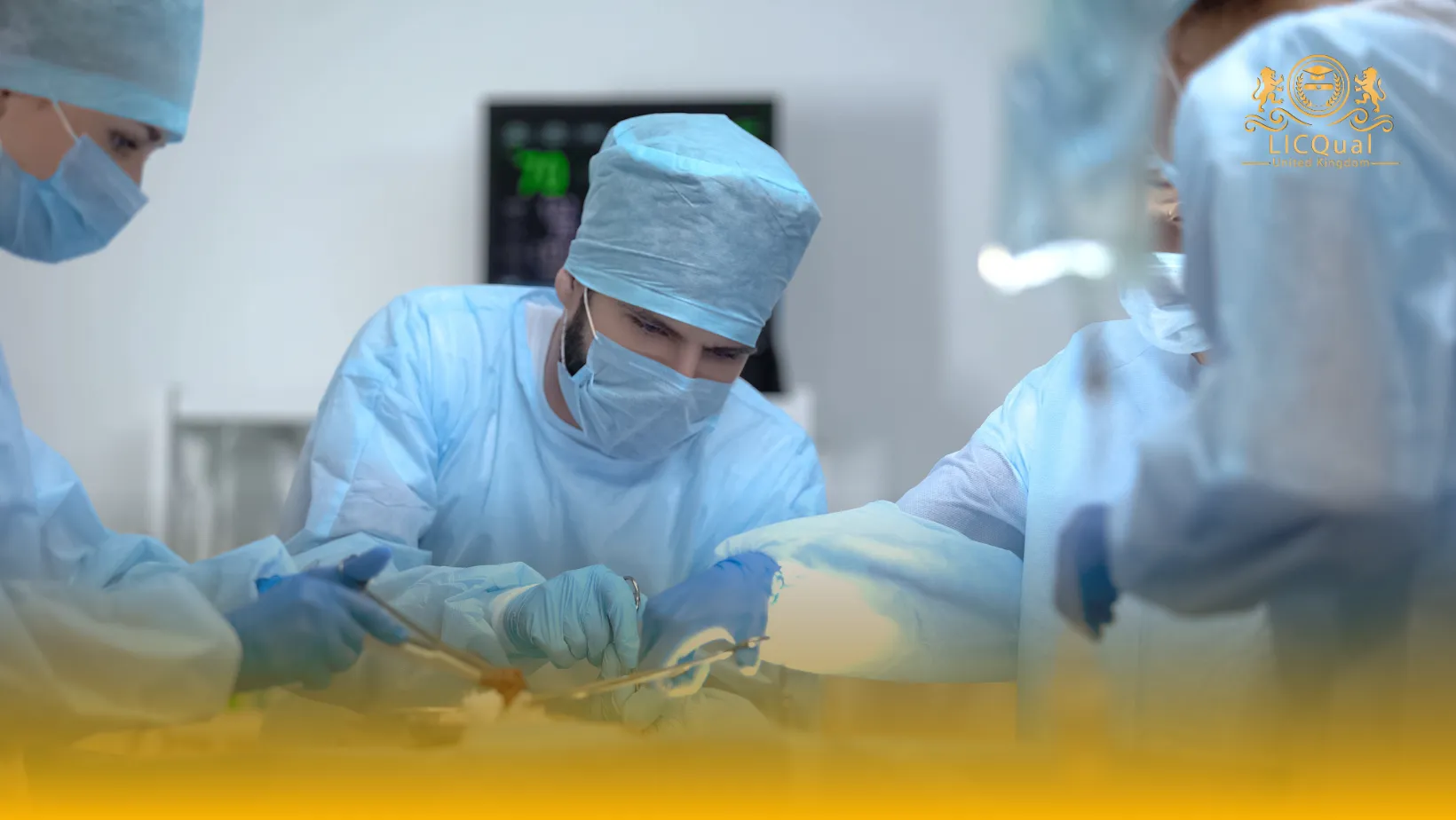The LICQual Level 7 Postgraduate Diploma in Cardiothoracic Surgery (PgDCTS) is a highly specialised qualification designed for experienced medical professionals who are committed to advancing their careers in the field of cardiothoracic surgery. This programme is not intended for fresh candidates but for established practitioners who wish to expand their clinical expertise, strengthen their leadership skills, and achieve significant Continuing Professional Development (CPD).
Cardiothoracic surgery is one of the most complex and demanding medical disciplines, requiring advanced knowledge, precision, and a deep understanding of patient-centred care. This postgraduate diploma has been carefully structured to equip learners with the latest theoretical insights and practical competencies needed to manage complex surgical procedures, enhance clinical decision-making, and contribute to improved patient outcomes.
In addition to advancing individual careers, this qualification ensures that learners gain skills aligned with international medical and academic standards, supporting professional recognition both locally and globally. The PgDCTS also provides a pathway to further academic progression, research opportunities, and leadership roles within surgical practice.
Centres delivering this programme must meet stringent requirements. They are expected to provide qualified and experienced teaching staff, along with modern learning resources, simulation facilities, and academic support services. This ensures a high-quality learning experience where every learner can achieve excellence.
By undertaking this qualification, learners position themselves at the forefront of surgical innovation, gaining not only enhanced expertise but also a competitive edge in today’s evolving healthcare environment.
Course Overview
Qualification Title
LICQual Level 7 Postgraduate Diploma in Cardiothoracic Surgery (PgDCTS)
Total Units
6
Total Credits
120
GLH
600
Qualification #
LICQ2200991
Qualification Specification
To enroll in the LICQual Level 7 Postgraduate Diploma in Travel Medicine (PgDTM), applicants must meet the following criteria:
|
Qualification# |
Unit Title |
Credits |
GLH |
|---|---|---|---|
|
LICQ2200991-1 |
Advanced Principles of Cardiothoracic Anatomy and Physiology |
20 |
100 |
|
LICQ2200991-2 |
Diagnostic and Investigative Techniques in Cardiothoracic Surgery |
20 |
100 |
|
LICQ2200991-3 |
Surgical Management of Cardiac Diseases |
20 |
100 |
|
LICQ2200991-4 |
Surgical Management of Thoracic Diseases |
20 |
100 |
|
LICQ2200991-5 |
Perioperative and Postoperative Care in Cardiothoracic Surgery |
20 |
100 |
|
LICQ2200991-6 |
Research Methods and Evidence-Based Practice in Cardiothoracic Surgery |
20 |
100 |
By the end of this course, learners will be able to:
Unit 1: Advanced Principles of Cardiothoracic Anatomy and Physiology
Learners will be able to:
- Demonstrate advanced knowledge of cardiovascular and thoracic structures and functions.
- Analyse the physiological mechanisms underlying cardiac and respiratory function.
- Critically evaluate the relationship between anatomy, physiology, and surgical outcomes.
- Apply anatomical and physiological knowledge to clinical and surgical decision-making.
Unit 2: Diagnostic and Investigative Techniques in Cardiothoracic Surgery
Learners will be able to:
- Assess the role of advanced imaging and diagnostic tools in surgical planning.
- Interpret radiological, echocardiographic, and laboratory findings with precision.
- Evaluate patient risk factors through evidence-based diagnostic methods.
- Integrate diagnostic data into clinical decision-making for safe and effective care.
Unit 3: Surgical Management of Cardiac Diseases
Learners will be able to:
- Demonstrate expertise in surgical interventions for coronary artery disease and valvular disorders.
- Critically evaluate operative techniques for congenital and acquired cardiac conditions.
- Apply best practices for managing cardiac emergencies and high-risk patients.
- Integrate surgical management with evidence-based perioperative care.
Unit 4: Surgical Management of Thoracic Diseases
Learners will be able to:
- Apply advanced surgical techniques for lung cancer, pleural conditions, and mediastinal tumours.
- Critically evaluate minimally invasive and robotic-assisted thoracic surgery methods.
- Assess surgical strategies in relation to patient safety and long-term outcomes.
- Incorporate international guidelines and evidence-based practices in thoracic surgery.
Unit 5: Perioperative and Postoperative Care in Cardiothoracic Surgery
Learners will be able to:
- Develop strategies for pre-surgical assessment and optimisation of patients.
- Manage critical care requirements, including ventilatory and haemodynamic support.
- Evaluate postoperative complications and apply evidence-based management strategies.
- Demonstrate leadership in multidisciplinary perioperative and recovery care teams.
Unit 6: Research Methods and Evidence-Based Practice in Cardiothoracic Surgery
Learners will be able to:
- Apply advanced research methodologies in clinical and surgical contexts.
- Critically appraise published research and assess its applicability to practice.
- Design and conduct independent research in cardiothoracic surgery.
- Promote innovation, evidence-based practice, and continuous professional development in surgical care.
The LICQual Level 7 Postgraduate Diploma in Cardiothoracic Surgery (PgDCTS) is designed for surgeons, healthcare professionals, clinicians, and medical practitioners seeking to specialize in advanced cardiac and thoracic surgical care. This Level 7 qualification is ideal for those who want internationally recognized credentials, practical skills in complex cardiothoracic procedures, and expertise in patient-centered surgical management. Whether you work in hospitals, private clinics, or academic settings, this diploma equips you with the knowledge and credibility to excel in cardiothoracic surgery.
Cardiothoracic Surgeons and Clinicians
- Designed for surgeons specializing in heart, lung, and thoracic surgery.
- Enhances expertise in coronary artery and valve replacement procedures.
- Builds advanced skills in minimally invasive and complex thoracic surgeries.
- Strengthens evidence-based clinical decision-making.
- Provides internationally recognized credentials for career advancement.
General and Cardiac Surgeons
- Ideal for general surgeons expanding into cardiothoracic specialties.
- Improves understanding of cardiac anatomy and thoracic surgical techniques.
- Enhances perioperative care and patient management skills.
- Builds confidence in handling complex surgical cases.
- Supports professional growth in hospital and private practice settings.
Nurses and Allied Health Professionals
- Tailored for surgical nurses, anesthetists, and allied health staff.
- Enhances patient monitoring and perioperative care knowledge.
- Develops skills in assisting complex cardiothoracic procedures.
- Builds understanding of ethical, legal, and professional standards.
- Supports continuing professional development (CPD) and clinical competency.
Medical Students and Postgraduate Trainees
- Suitable for graduates pursuing specialization in cardiothoracic surgery.
- Provides foundational knowledge in cardiac and thoracic procedures.
- Enhances clinical reasoning, research, and surgical planning skills.
- Prepares learners for postgraduate surgical training.
- Offers internationally recognized certification to boost career prospects.
Healthcare Managers and Hospital Administrators
- Designed for managers overseeing cardiothoracic surgery departments.
- Enhances knowledge of operational planning and clinical governance.
- Supports implementation of surgical protocols and patient safety measures.
- Promotes quality assurance in cardiothoracic surgical services.
- Builds leadership skills for hospital or private clinic management.
International Healthcare Professionals
- Perfect for global learners seeking UK-recognized cardiothoracic surgery training.
- Offers flexible online learning to balance study and professional commitments.
- Equips learners with skills for advanced cardiac and thoracic care internationally.
- Builds credibility in global surgical and medical networks.
- Supports career growth and international professional opportunities.
Private Clinic and Hospital Practitioners
- Designed for surgeons and clinicians running private cardiothoracic clinics.
- Enhances patient consultation and advanced surgical planning expertise.
- Builds proficiency in operative techniques, perioperative care, and post-surgical follow-up.
- Encourages application of best practices in private clinical settings.
- Supports professional credibility and career progression in cardiothoracic surgery.
Centres offering the LICQual Level 7 Postgraduate Diploma in Cardiothoracic Surgery (PgDCTS) must demonstrate the highest standards of academic and professional delivery. To ensure learner success and the integrity of the qualification, centres are required to meet the following criteria:
- Qualified and Experienced Faculty – Trainers, assessors, and academic staff must hold relevant postgraduate or professional qualifications in cardiothoracic surgery or related medical fields, alongside proven clinical and teaching experience.
- Appropriate Facilities and Resources – Centres must provide access to well-equipped learning environments, including surgical skills labs, simulation facilities, and up-to-date medical resources.
- Comprehensive Learning Materials – High-quality study guides, reference materials, and digital resources must be available to support advanced learning and research.
- Robust Assessment and Quality Assurance – Centres should implement structured assessment methods, internal verification, and external moderation to maintain academic excellence.
- Clinical and Practical Opportunities – Where possible, learners should have access to clinical placements, case studies, or simulated practice to enhance applied surgical skills.
- Commitment to CPD and Innovation – Centres must encourage ongoing professional development for both learners and teaching staff, ensuring the latest advancements in cardiothoracic surgery are incorporated.
- Learner Support Services – Comprehensive academic and pastoral support must be available, including guidance on research projects, study skills, and career progression.
By meeting these requirements, centres can ensure the delivery of a globally respected and high-quality postgraduate qualification that empowers learners to advance their expertise in cardiothoracic surgery.
Assessment and Verification
All units within this qualification are subject to internal assessment by the approved centre and external verification by LICQual. The qualification follows a criterion-referenced assessment approach, ensuring that learners meet all specified learning outcomes.
To achieve a ‘Pass’ in any unit, learners must provide valid, sufficient, and authentic evidence demonstrating their attainment of all learning outcomes and compliance with the prescribed assessment criteria. The Assessor is responsible for evaluating the evidence and determining whether the learner has successfully met the required standards.
Assessors must maintain a clear and comprehensive audit trail, documenting the basis for their assessment decisions to ensure transparency, consistency, and compliance with quality assurance requirements.







